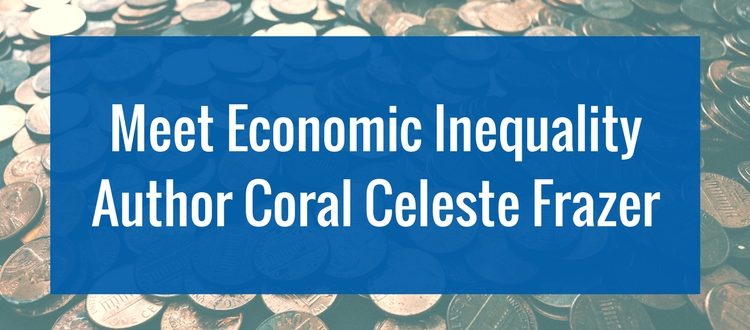Meet Economic Inequality Author Coral Celeste Frazer

By Domenica Di Piazza, Editorial Director of Twenty-First Century Books
I invited one of Twenty-First Century Book’s newest writers–Coral Celeste Frazer–to talk about her new YA title for the imprint. Economic Inequality: The American Dream under Siege is out this spring.
In this starred review, Booklist praised Frazer’s approach, commenting that, “This remarkably even-handed, lucid volume confidently leads readers through the murky world of wealth and economics in America. . . . Instructive, galvanizing nonfiction for a critical issue with widespread effects.” You’ll want to add this title to your collection.
Q&A with Coral Celeste Frazer
Why do you write for teens?
I remember what it was like to be a teenager, how hungry I was to figure out how the world worked, and how much I hoped that, one day, I’d be able to make it a better place. I’m writing to reach that teenage me, plus the young people today with a similar hunger for knowledge and passion for social justice.
More specifically, why did you decide to write about economic inequality for teens?
 That’s a good question. Many of my friends and acquaintances have been surprised—even skeptical—at the idea of a book on economic inequality for teens. I have to admit, it wasn’t my first thought either!
That’s a good question. Many of my friends and acquaintances have been surprised—even skeptical—at the idea of a book on economic inequality for teens. I have to admit, it wasn’t my first thought either!
After I meet Domenica at the 21st Century Children’s Nonfiction Conference in New York in 2015, she invited me to brainstorm ideas for a book to work on together. I was putting together an email of ideas, and I wanted one more topic to round out the list. My husband suggested economic inequality. It was all over the news. Politicians on both sides of the aisle were talking about it. But despite its timeliness and importance, I was still surprised when that was the topic Domenica picked!
And the more I thought about it, the more I became convinced that this book was desperately needed. It’s hard to imagine anything that will have a bigger impact on the lives of young people than economic inequality. Concentration of wealth affects the quality of the education young people get, their chances of being able to afford to go to college, their chances of getting a job. It even affects how much their votes matter, as opposed to being drowned out by the interests of wealthy corporations.
Yet very little has been written on this topic for young people. Most of the material out there for adults is inaccessible to the average teen because of all the jargon and assumed knowledge. Yet there’s no reason that teens can’t understand this stuff, if you take the time to explain the technical terms and provide the necessary background information.
How did you do the research for this book? What did you learn in the process?

I learned an enormous amount, actually! Some aspects of this book were more familiar to me, like the chapter on inequality of opportunity. I’d studied a lot about social mobility and the injustices in our education system in grad school.
But other parts of the story were things about which I had only general knowledge and no real expertise. In a way, this was an advantage because the things I realized I didn’t fully understand were also things I knew I needed to explain in the book. Like, if I don’t really understand how economic bubbles work, I should definitely devote some time to that. Or, if my idea of what lobbyists do is a bit hazy, then I should include a sentence or two about that. So there was a lot of teaching myself so that I could teach others.
As for how I did the research, first, I read a lot of books and scholarly articles written by economists, sociologists, and political scientists. Throughout the process–researching, outlining, drafting, and revising the book–I spent a lot of time on the internet chasing down the latest available statistics to illustrate my claims and to back up my arguments. Things change quickly, especially in terms of who is richer than whom among the top of the top, and how big their fortunes are.
Meanwhile, it takes a lot of time to collect data about the general population and then to process that data and put it into a form that researchers and journalists and writers like me can use. So the numbers weren’t always as up-to-date as I would have liked. But I was very careful to make sure that I didn’t assert any facts without having evidence from a reliable source to back them up.
Finally, what do you like to read for leisure?
I’ve recently enjoyed the novels Eleanor Oliphant Is Completely Fine by Gail Honeyman, State of Wonder by Ann Patchett, and Americanah by Chimamanda Ngozi Adichie. If I want something fluffy to rest my brain, Georgette Heyer [an author or historical romances and detective fiction] often hits the spot.
Learn more
To learn more, about Economic Inequality you can visit our website or the book’s Edelweiss detail page.
For more nonfiction books for teens, read this post on STEM nonfiction, this guest post from Fandom author Francesca Davis DiPiazza, or this Q&A with 3D Printing author Melissa Koch.
Comments